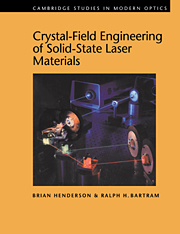Book contents
- Frontmatter
- Contents
- Preface
- 1 An introduction to lasers
- 2 Symmetry considerations
- 3 Optical crystals: their structures, colours and growth
- 4 Energy levels of ions in crystals
- 5 Spectra of ions in crystals
- 6 Radiationless transitions
- 7 Energy transfer and excited state absorption
- 8 Covalency
- 9 Engineering the crystal field
- 10 The crystal field engineered
- References
- Index
Preface
Published online by Cambridge University Press: 24 September 2009
- Frontmatter
- Contents
- Preface
- 1 An introduction to lasers
- 2 Symmetry considerations
- 3 Optical crystals: their structures, colours and growth
- 4 Energy levels of ions in crystals
- 5 Spectra of ions in crystals
- 6 Radiationless transitions
- 7 Energy transfer and excited state absorption
- 8 Covalency
- 9 Engineering the crystal field
- 10 The crystal field engineered
- References
- Index
Summary
Almost four decades have passed since Maiman invented the ruby (Cr3+:Al2O3) laser. The intervening years have witnessed many major achievements and much innovation, culminating in a plethora of devices that impinge in many walks of life. Fundamental studies and technology have been pursued with vigour, separately and in tandem, with resulting applications in materials and device processing, optical, communication and information sciences, and medical and paramedical sciences. Such applications have the potential to materially transform our everyday living at home, at work and at leisure. Optical devices that were once regarded as revolutionary but which are taken now for granted include the fibre laser, responsible for dramatically improving the quality and cost of intercontinental telephone calls, and the compact disc, now the ubiquitous storage medium for optical information. The scope of optical materials discussed in this monograph is very broad, indicating the potential sweep of exciting and novel developments in the short and long term futures.
Ruby lasers of the kind invented by Maiman, and discussed in this monograph, operate on the Cr3+ R-line emission near 694 nm: they are pumped by the ruby's absorption of some of the visible light from a xenon flashlamp. The He–Ne laser was reported soon thereafter, since when laser action has been observed on many thousands of transitions in the gas phase, including 200 or so on neutral Ne alone.
- Type
- Chapter
- Information
- Crystal-Field Engineering of Solid-State Laser Materials , pp. xiii - xviPublisher: Cambridge University PressPrint publication year: 2000

